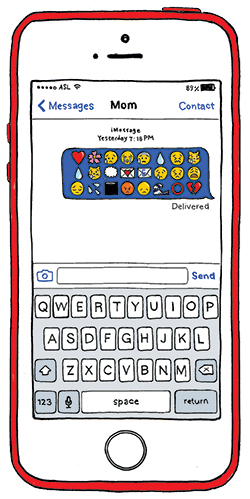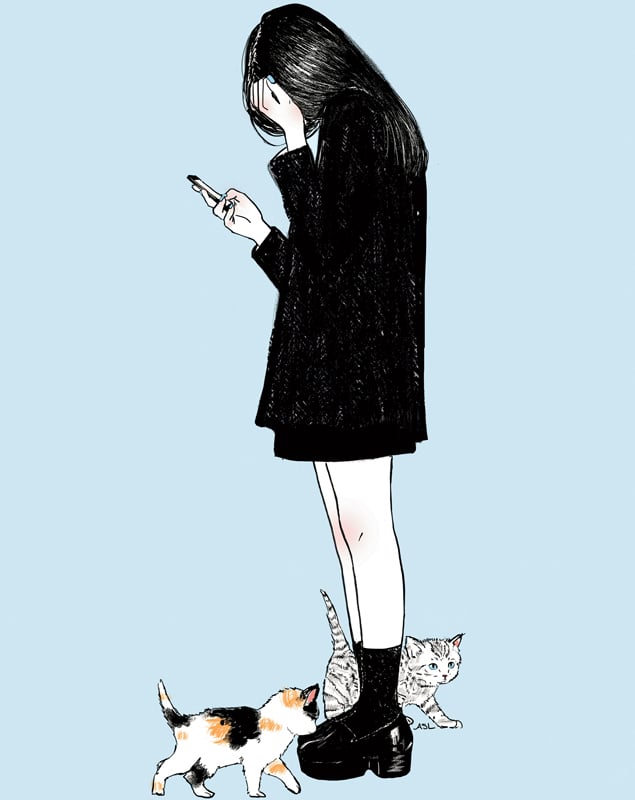I was 25 years old when I found out cancer would take my mom from me.
It was cherry-blossom time, and whenever I left my apartment that week, it felt like all the other twentysomethings in Columbia Heights were out giving their families the cheery pink-blossom tour of their new big-city lives—their parents’ mortality the furthest thing from their minds.
I’m from Minneapolis, and when I came to DC in 2010 for a job in journalism, I worked pretty hard not to feel different from the many other young millennials pouring into the city at the time. Yes, my mom had had cancer for several years, but by then she was doing well. All of that changed abruptly with a phone call in the spring of 2011. Suddenly the tumors were back and clustering beside her lungs, and I knew it wouldn’t be long before I’d have to go back home.
That fall, I said goodbye to Washington and settled back into my childhood room. Mom and I soon slipped back into our old, comfortable roles. A lot of the time, it didn’t even feel like she was sick. She returned to work, and we went north on a couple of vacations. Although she was getting chemo and lost her hair, she seemed to be able to push through whatever pain she was feeling, or at least do her best to hide it from us.
Even when a bad scan lit up with tumors and it was clear she wasn’t going to beat the disease, she acted as if she would.
“I’m not going anywhere,” she told me.
I was old enough to know that wasn’t true—but it was what I needed to hear at that moment, and my mom knew it.
On the surface, my situation may have looked like something timeless—an adult child stepping up to help in a time of need—but the specifics felt very 21st century: I hadn’t yet achieved so many of those things I associated with adulthood, and I was terrified that my mom wouldn’t be there with me when I achieved them. I was chronologically an adult but, like so many of my peers, was still missing all those grown-up credentials her generation had gained by the time they were my age.
She and I never talked about that. Or about what our family—Mom, Dad, Emily, Peter—would look like if it came undone. We didn’t go near any conversations about the big things she’d miss out on, like the moment I’d find the man I wanted to marry or sharing the excitement of my wedding day. We just focused on the trivial little things that had always connected us.
We’d send each other funny cat videos—my mom was a pet-pusher—and e-mail back and forth about her favorite internet celebrity, Jessica the Hippo, from South Africa. We’d talk about the assorted minutiae of my job.
I had a boyfriend then, and plenty of friends, but my parents were still the only people in my life who genuinely cared to hear about my shitty or excellent or insert-any-other-adjective day at work. My mom was the only person I’d ever call for no reason at all.
Throughout her illness, I even had childish hopes about things I was sure could save her. Like if I adopted a cat. Something positive to talk and think about and watch grow up. Early on, the two of us spent hours scouring listings for irresistible-looking rescue kittens until we found the perfect companion, a calico I named Ramona.
The day I took the cat home, my mom was in the ICU hooked up to a breathing tube, yet all Mom wanted to hear about was Ramona, her “first granddaughter.”
Later, after we learned the chemo wasn’t working anymore, I adopted a six-pound tabby named Harriet. At the time, I said it was because Ramona needed a sibling. Now I realize I just wanted my mom to connect with something that would live on with me after she was gone. The way she would have if I’d been more grown-up before she died and had given her an actual grandchild instead of a couple of cats.

My mom died on January 27, 2013. I was mostly in denial about it until the very end, and when it finally came, the gloom I sank into was profound. For six months, I could hardly function. It was as if I’d become estranged from everyone in my life.
At the radio station where I now work, I’m young enough to be the daughter of many of my baby-boomer coworkers. The death of a parent is a common occurrence. My loss was acknowledged like every other: a card passed around to sign, a meal delivered to my home during funeral planning. But the brutal specifics of it felt so different from those of my colleagues who had buried 80-year-old parents. Didn’t they realize?
I had the same thought right after I returned to the office and met with an older colleague in HR to talk about how I would readjust to work. She tried to commiserate by telling me all about her elderly parents. She said she was grateful they were still around but that they were also getting needy—and taking care of them was hard.
“You have no idea how lucky you are!” I wanted to scream. “I would give anything to have my mom back, and I would take care of her every day and never complain!”
Plenty of people get uncomfortable about death and say tone-deaf things to the bereaved. But there seemed to be a common thread here: My loss, I think, required a different kind of vocabulary, one that my colleagues—and most other people—didn’t have.
Out in the newsroom, people generally acted as if I’d taken a long weekend away. As the days and weeks piled on, I became obsessed with the silence. Did my colleagues not offer any condolences because they didn’t know what to say? Were they worried they would make me cry? Or was it me—was I crazy?
Outside work, my friends did all they could to comfort me, but it wasn’t enough, and even more than my coworkers, they weren’t in much of a position to empathize. I was the Debbie Downer who now avoided going out and who spent all her free time reading Cheryl Strayed and Meghan O’Rourke and every other female author who’d lost her mother and written a book about it. My friends were obsessing over things like how their mom made some weird comment about their weight.
• • •
As a society, we know how to offer condolences to middle-aged friends who’ve lost an elderly parent. But there’s no script to pull out for a loss like mine. It’s not quite the juvenile-bereavement tragedy, but not quite the adult way-of-the-world one, either.
It seemed to me that people saw my mom’s death as borderline bearable, a setback. It was obviously wrong, because she was only 56—but it wasn’t totally tragic, either, because we did have 27 years together.
I was angry that no one seemed to know how to console me, and desperate to connect with someone who’d survived the same thing. But the more I looked, the less I found. I came across only one support group for people who’d lost a parent, and I resisted it at first—I couldn’t be expected to feel sorry for a bunch of 50-year-olds.
Finally, after six months, I decided to give the group a try. When I walked in the first night, I was shocked to find myself with three other women in their twenties. It turned out that this was no accident—the intake therapist had put us together on purpose.
The four of us spent our summer bringing our parents to life in that room. I hauled in my favorite photos of my mom, jewelry and purses she had made, cards she had sent me on occasions big and small. “We are so sorry about your breakup and that you’re feeling so sad,” she wrote me once while I lived in Washington. “You are such a bright, beautiful, lively person (total babe).”
But mostly the other women and I vented. We worked through how awful it felt when friends changed the subject every time the topic of our dead parent came up and how frustrating it was that they didn’t understand we weren’t going to “get over it” the way we would a breakup.
Because none of us were married or mothers yet, many of our most intense conversations centered on the future and how we’d manage during the milestones we knew were still ahead—all those subjects my mother and I never broached. For instance: How could we possibly become good parents someday ourselves?
That thought was constantly on my mind, as I saw friends starting to Facebook and Instagram about the birth of their first child, and the shout-outs to their moms, who were nice enough to stay over and help out.
Grief Resources for Young Adults

Wendt Center for Loss and Healing
Individual counseling at the Wendt Center.
Capital Caring
Support groups for people who have lost a parent.
And it’s something the girls from my support group and I still grapple with. Though our formal sessions ended in the fall of 2013, the four of us still meet up. We’re getting to know one another socially now, the way people do when they’re new acquaintances, and that’s been surprisingly interesting. When it comes to our careers, our worldviews, even our tastes in restaurants, we have almost nothing in common. If our parents hadn’t died while we were in our twenties, I don’t know that we ever would have met. But because they did, we’ve become close in a way I may never replicate with friends I’ve had for much longer.
I’ve put a lot of thought into why I grieved the way I did, and I’ve come to believe that biology probably had something to do with how hard I took my mom’s death. But I don’t believe it was the only factor—I think there was something generational at work, too.
Everyone has read the oft-cited stats about how millennials like me have put off marriage and children, the two big things so many of our parents embraced as twentysomethings. But Jeffrey Arnett, a professor at Clark University in Worcester, Massachusetts, who studies millennials, told me there’s an emotional aspect to this cultural shift that’s lesser known. Arnett says millennials are going through a completely new life stage he calls “emerging adulthood.”
By the time we reach our early to mid-twenties, we may have graduated from college and gotten our first real jobs, but emotionally we’re not growing up as quickly as our mothers and fathers did. Millennials came of age with the internet and amid the uncertainties of a recession, and that’s connected us to our parents in ways that Gen Xers and boomers never were with theirs. And now, because at age 26 or 27 we’re not rushing to walk down the aisle or buy our first home, we still think of our parents as the central pillars of our family.
This change has largely been positive, Arnett said: “It’s made that relationship honestly closer for longer than I think it’s ever been before.”
But as I’ve now learned, there’s a downside, too, one that’s tied to actuarial math. As more people stay in emerging adulthood longer, more of them will lose their parents at a stage of life where science—not to mention friends and neighbors—doesn’t quite know how to understand the psychological implications.
“You still need your mom,” Arnett said. “You needed your mom more than she needed you.”
He was right. Because I didn’t have kids or a husband or any real, serious adult obligations besides my job, it wasn’t like some switch went off after my mom died and I suddenly felt I was the one who had to be the grownup now. For all practical purposes, I was still a kid myself.
It was no wonder I wanted everyone to treat my grief like a child’s.
• • •
Last August, my dad, my brother, and I took a trip to the East Coast in memory of Mom. She had spent a few fun years in Boston and Portland, Maine, in her twenties, and she’d always dreamed of a family trip someday to give us a glimpse into her life before we came along.
On the last day, we carried her ashes to the shore of a small island opposite Portland. I walked out up to my knees in the numbing water, wiggled my toes in the sand, and clutched the box to my chest one last time. Then I poured her into the water below.
I wanted the bone-white shards to disappear, to mix into the sand or drift out to sea. But the water was so still and clear that she sank straight to the bottom and just stayed there, a pile of ash beneath my feet.
Two years after her death, my mom is still with me every day. One of the kids I babysit will say something I know she would have found hilarious. (She worked in an elementary school.) Or one of my cats will be going through some funny phase that she’d get a kick out of. Not long ago, my brother got his first real adult job—and that hurt, to think how proud she would have been.
But the worst times are those moments when something reminds me I have so much growing up left to do without her. I’ll think about how my future husband will never know her, or how when I buy my first home, I won’t be able to have her over for dinner with my dad. I think about how far off all this may still be for me.
I’m 28 and single, and I can’t imagine sharing my home with anyone but Ramona or Harriet anytime soon. For now, that’s okay. They couldn’t save her, but she loved them all the same.
Emily Kaiser, a former web producer at Washington City Paper, works for Minnesota Public Radio. She can be reached at emilymkaiser@gmail.com.
This article appears in our January 2015 issue of Washingtonian.


















